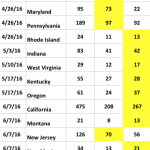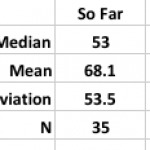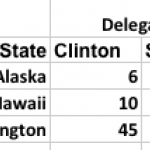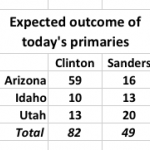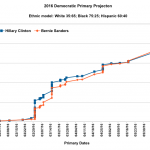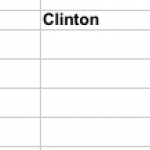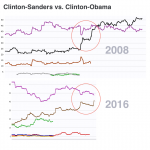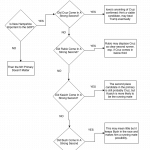Election 2016
As you know, I've been applying a model to predict the outcome of each of the Democratic Primary contests, and have done pretty well at predicting results.
All of the future contests are primaries, not caucuses. It turns out that the two modes have very different patterns. Many have suggested that this has to do with how the process works, and somehow caucuses, or open contests, favor Sanders, who has won several. However, it also turns out that caucusing is a northern thing (and Sanders does somewhat better in the north, or more accurately perhaps, rarely wins in the south). Caucusing is…
How does the "southernness" of a state affect the Democratic Primary?
Clinton has been doing well in "The South." Of course, defining what "The South" is is pretty tricky. I divided up the states by "Deep South" vs. Other, so all the usual orginal deep south states count as "southern" except Florida. You know what they say about Florida. "The farther south you go, the farther north you get." Also, Texas is not deep south in the traditional sense.
Using this rough division, Clinton wins all the time in the "Deep South" and Sanders wins some and loses some in the other states, as shown in…
When either candidate wins a state, that candidate's supporters celebrate and underscore the significance of that win. The other candidate's supporters generally proceed to explain how it was not a significant win, or in some cases, come up with conspiracy theories about how the election was stolen.
So, here is an interesting question: Does one candidate or another, between Hillary Clinton and Bernie Sanders, tend to win bigger states more, or smaller states more? This is important because next Tuesday is the New York Primary, and New York is huge. Of course, state size is not the only…
The important thing first.
I predicted who would win the Wisconsin primary, although my prediction suggested that Sanders would do better than he did. (He underperformed.) I predicted the outcome of the Wyoming primary exactly.
These are the most recent two in a long series of mostly correct predictions of which Democratic candidate will win each of the contests in this long presidential primary season. My predictions of which candidate would win have been mostly accurate, but also, fairly accurate with respect to how many delegates each candidate would pick up.
Several primaries back, for…
I'll post the results when they are available, after 8 or 9 PM central, below.
Meanwhile, as of 6PM Central time, early info from Wisconsin suggests that Sanders will do very well in today's primary.
The good news for Sanders: My prediction of 55 delegates for Sanders and 31 delegates for Clinton appears to be on track.
Bad news for Sanders: The same model that predicts that still says 2096 committed delegates for Clinton and 1747 for Sanders by the end of the primary season.
The Wyoming primary, this Saturday, should be about even for the two candidates.
In the New York primary, which is…
A new poll (March 24th) by Monmouth University says, "Among Democrats who support Bernie Sanders for their party’s nomination, 78% say they would vote for Clinton over Trump in November, while 12% would actually vote for Trump and 7% would not vote at all."
The Republicans have a similar problem, where "two-thirds (68%) of voters who back Ted Cruz for the GOP nomination say they would vote for Trump in November, while 13% would vote for Clinton and 10% would not vote. Among Republicans who back John Kasich, just 50% would vote for Trump and 19% would vote for Clinton, with 22% saying they…
This discussion is a little ambiguous about "winning the nomination" vs. "winning the general election" but it is fun to see Keith Olbermann again. He states here that he is coming out of retirement.
Olbermann correctly points out something I think a lot of people don't know or understand. A political party is an independent private entity (though there are some regulations and they must operate within the law). One of the first things they will do at the convention is to vote on rules. At that point, they can make any rule they want, pretty much. The rule could be "no nomination for…
Today and tomorrow we have the Alaska, Hawaii, and Washington Democratic primaries.
According to the model I developed prior to the last primary, which predicts future primaries using information about primaries to date (which I've not updated from last Tuesday), Sanders will win all three primaries. That model suggests that the delegate spread by the end of the day will look like this:
However, I also developed an alternate model which assumes that Sanders' over performance (in relation to the afore mentioned model) requires an adjustment. That alternative model suggests that this will…
This post was written in two parts, pre-primary and post-primary. To see the result and a discussion of what they mean, skip down to the last part of the post, where I'll discuss why Tuesday's results may mean that Sanders could win the primary.
Pre-Primary
As already discussed, Clinton is likely to win the Democratic nomination. Sanders is too far behind to catch up without extraordinary results, as outlined here. However, it is also true that Sanders is likely to win a majority of contests from here on out, while at the same time, Clinton is likely to win many (if not most?) of the actual…
I developed a predictive model for the Democratic primaries that was designed to have the following features:
1) It does not rely on polling;
2) It does use exit polling and other information to set certain parameters;
3) It mainly uses prior primary or caucus results to predict the future, and thus assumes that the status quo is the best indicator.
4) It calculates likely voting patterns based on ethnicity (White, African American, Hispanic), and using likely Democratic party distribution among these groups to predict each contest's outcome.
That method outperformed most other predictions…
This weekend there are Democratic Party primaries or caucuses in Kansas, Louisiana, Nebraska, Maine and Puerto Rico. The model I developed for predicting primary and caucus outcomes indicates the following results as most likely:
Sanders is losing the primaries, so far, and Clinton is on the path to victory. However, Sanders has a fair amount of time to catch up. Perhaps he just needs his strategy to take hold. The idea was to have a revolution, which in this case, means a lot of people show up. A lot of people did show up, but not enough. Sanders needs to get the rest of them to show up…
You may be asking yourself the same question, especially if, like me, you vote on Tuesday, March 1st.
For some of us, a related question is which of the two is likely to win the nomination.
If one of the two is highly likely to win the nomination, then it may be smart to vote for that candidate in order to add to the momentum effect and, frankly, to end the internecine fighting and eating of young within the party sooner. If, however, one of the two is only somewhat likely to win the nomination, and your preference is for the one slightly more likely to lose, then you better vote for the…
It is far too early to predict the outcome of the Democratic Party primary. Personally, I like both of the candidates and will support whichever one is selected to run in the general election. Both candidates have strong reasons to vote for them, and each candidate has their own “electability” issues. I vote on March 1st, and have not yet decided whom to vote for.
Why would I start out an essay, an essay that is meant to be an objective analysis, with that statement? Because the validity of a statement, opinion, or analysis of the current primary process is inevitably evaluated in terms of…
At about 9 PM eastern, with 90% of the votes counted in the Democratic primary, Sanders is showing a strong win. He is currently at about 60%, while Clinton is at 38%. That gap is significantly larger than what I had intuitively established at the cutoff for a Sanders "lower than expectation loss." So, congratulations Bernie Sanders! If those numbers hold, that is a decisive win.
(A lot of Sanders supporters were crowing about a 20% lead in the polls, which seemed kind of extreme at the time. They may end up being proven right!)
In the Republican primary, with about 90% reporting, Donald…
I wrote about what I thought might happen in the New Hampshire primary a few days ago, but enough new stuff has happened to make it worth revisiting.
Who will win the New Hampshire GOP Primary?
And, perhaps more important, who will come in second, third, and fourth?
We know that Donald Trump will win the New Hampshire primary. Polls show him up far above the other candidates, he has been on a modest upward trend since the beginning of the year, and the most recent polls show an abrupt upward swing. He now stands at about 17% above the second place candidates.
New Hampshire seems to like…
I watched the debate pretty closely, and in my opinion, both candidates did pretty well and it was mostly an even contest. (Note: I am not committed to one or the other candidate, I happen to like them both.)
Sanders did very well in getting his message across, but he demonstrated weakness in foreign policy.
Clinton did a good job at addressing the alleged Wall Street ties and addressing the email issue.
But there is another way to answer the question. How much did each candidate strengthen their own support, and how much did each candidate do to convince undecided individuals to prefer…
SEE THIS UPDATE
ADDED: Following the GOP primary, there has been another development. In most recent polls, Trump is clearly ahead in New Hampshire, with Marco Rubio a moderately strong second or third. In various polls he is second in most polls (by a few points) and tied in one. Kasich is generally right behind Rubio, with Cruz in third place in a few polls.
Rubio crashed and burned in last night's debate, according to most observers. And he really did. So, this may be reflected in New Hamsphire with Rubio moving down quite a bit. He crashed in part because Christie skillfully skewered…
Was the Iowa Caucus outcome determined by a coin flip?
We have seen several reports that Hillary Clinton won the Iowa Caucus by a coin toss, or by six coin tosses. Or some other number. We've also seen reports that six delegates were awarded to Clinton on the basis of coin tosses, implying that of the 44 delegates determined on Monday in Iowa a large percentage were chosen by the toss of an unfair coin, that somehow the Clinton campaign controlled the coin tosses causing them to all come out in her favor. And so on.
After a barrage of these reports, we are now seeing a small number of reports…
Increasingly, I feel the need to declare my position on the candidates before commenting on the process, because, increasingly, the conversation has become one of comparative litmus tests. So, here's the deal on that: I like Clinton and Sanders both, and I like each of them for both overlapping and different reasons. As a life long Democrat I'm glad to see such good candidates running. I will decide whom to support in the Minnesota Caucus some time after I walk into the building, most likely. Then, later, I will decide which candidate, if any, I might work for during the time between our…
As of 8:45 or so PM:
Cruz 28.9 Trump 25.6 Rubio 20.8
I'm privileged to live in Minnesota, which is Iowa's neighbor and thus not so different from Iowa, except our college football teams are better.
And it isn't just the corn, but also, the caucus. We do that here too. Our caucus system is similar enough to Iowa that one can have a sense of what goes on over the border just with some local experience.
So let me tell you a story. I volunteered one day to help out a friend with a local campaign. The idea was to show up at the local VFW post and engage in a caucus to determine a DFL (that's…
